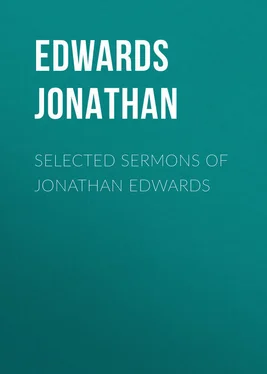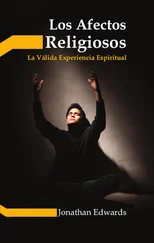Jonathan Edwards - Selected Sermons of Jonathan Edwards
Здесь есть возможность читать онлайн «Jonathan Edwards - Selected Sermons of Jonathan Edwards» — ознакомительный отрывок электронной книги совершенно бесплатно, а после прочтения отрывка купить полную версию. В некоторых случаях можно слушать аудио, скачать через торрент в формате fb2 и присутствует краткое содержание. Жанр: foreign_religion, foreign_antique, foreign_prose, на английском языке. Описание произведения, (предисловие) а так же отзывы посетителей доступны на портале библиотеки ЛибКат.
- Название:Selected Sermons of Jonathan Edwards
- Автор:
- Жанр:
- Год:неизвестен
- ISBN:нет данных
- Рейтинг книги:3 / 5. Голосов: 1
-
Избранное:Добавить в избранное
- Отзывы:
-
Ваша оценка:
- 60
- 1
- 2
- 3
- 4
- 5
Selected Sermons of Jonathan Edwards: краткое содержание, описание и аннотация
Предлагаем к чтению аннотацию, описание, краткое содержание или предисловие (зависит от того, что написал сам автор книги «Selected Sermons of Jonathan Edwards»). Если вы не нашли необходимую информацию о книге — напишите в комментариях, мы постараемся отыскать её.
Selected Sermons of Jonathan Edwards — читать онлайн ознакомительный отрывок
Ниже представлен текст книги, разбитый по страницам. Система сохранения места последней прочитанной страницы, позволяет с удобством читать онлайн бесплатно книгу «Selected Sermons of Jonathan Edwards», без необходимости каждый раз заново искать на чём Вы остановились. Поставьте закладку, и сможете в любой момент перейти на страницу, на которой закончили чтение.
Интервал:
Закладка:
Man was dependent on the power of God in his first estate, but he is more dependent on his power now; he needs God’s power to do more things for him, and depends on a more wonderful exercise of his power. It was an effect of the power of God to make man holy at the first; but more remarkably so now, because there is a great deal of opposition and difficulty in the way. ’Tis a more glorious effect of power to make that holy that was so depraved and under the dominion of sin, than to confer holiness on that which before had nothing of the contrary. It is a more glorious work of power to rescue a soul out of the hands of the devil, and from the powers of darkness, and to bring it into a state of salvation, than to confer holiness where there was no prepossession or opposition. Luke xi. 21, 22, “When a strong man armed keepeth his palace, his goods are in peace; but when a stronger than he shall come upon him, and overcome him, he taketh from him all his armor wherein he trusted, and divideth his spoils.” So ’tis a more glorious work of power to uphold a soul in a state of grace and holiness, and to carry it on till it is brought to glory, when there is so much sin remaining in the heart resisting, and Satan with all his might opposing, than it would have been to have kept man from falling at first, when Satan had nothing in man.
Thus we have shown how the redeemed are dependent on God for all their good, as they have all of him.
Secondly, They are also dependent on God for all, as they have all through him. ’Tis God that is the medium of it, as well as the author and fountain of it. All that we have, wisdom and the pardon of sin, deliverance from hell, acceptance in God’s favor, grace and holiness, true comfort and happiness, eternal life and glory, we have from God by a Mediator; and this Mediator is God, which Mediator we have an absolute dependence upon as he through whom we receive all. So that here is another way wherein we have our dependence on God for all good. God not only gives us the Mediator, and accepts his mediation, and of his power and grace bestows the things purchased by the Mediator, but he is the Mediator.
Our blessings are what we have by purchase; and the purchase is made of God, the blessings are purchased of him, and God gives the purchaser; and not only so, but God is the purchaser. Yea, God is both the purchaser and the price; for Christ, who is God, purchased these blessings for us by offering up himself as the price of our salvation. He purchased eternal life by the sacrifice of himself: Heb. vii. 27, “He offered up himself;” and ix. 26, “He hath appeared to take away sin by the sacrifice of himself.” Indeed it was the human nature that was offered; but it was the same person with the divine, and therefore was an infinite price: it was looked upon as if God had been offered in sacrifice.
As we thus have our good through God, we have a dependence on God in a respect that man in his first estate had not. Man was to have eternal life then through his own righteousness; so that he had partly a dependence upon what was in himself; for we have a dependence upon that through which we have our good, as well as that from which we have it. And though man’s righteousness that he then depended on was indeed from God, yet it was his own, it was inherent in himself; so that his dependence was not so immediately on God. But now the righteousness that we are dependent on is not in ourselves, but in God. We are saved through the righteousness of Christ: he is made unto us righteousness ; and therefore is prophesied of, Jer. xxiii. 6, under that name of “the Lord our righteousness.” In that the righteousness we are justified by is the righteousness of Christ, it is the righteousness of God: 2 Cor. v. 21, “That we might be made the righteousness of God in him.”
Thus in redemption we han’t only all things of God, but by and through him: 1 Cor. viii. 21, “But to us there is but one God, the Father, of whom are all things, and we in him; and one Lord Jesus Christ, by whom are all things, and we by him.”
Thirdly, The redeemed have all their good in God. We not only have it of him, and through him, but it consists in him; he is all our good.
The good of the redeemed is either objective or inherent. By their objective good I mean that intrinsic object, in the possession and enjoyment of which they are happy. Their inherent good is that excellency or pleasure which is in the soul itself. With respect to both of which the redeemed have all their good in God, or, which is the same thing, God himself is all their good.
1. The redeemed have all their objective good in God. God himself is the great good which they are brought to the possession and enjoyment of by redemption. He is the highest good and the sum of all that good which Christ purchased. God is the inheritance of the saints; he is the portion of their souls. God is their wealth and treasure, their food, their life, their dwelling-place, their ornament and diadem, and their everlasting honor and glory. They have none in heaven but God; he is the great good which the redeemed are received to at death, and which they are to rise to at the end of the world. The Lord God, he is the light of the heavenly Jerusalem; and is the “river of the water of life,” that runs, and “the tree of life that grows, in the midst of the paradise of God.” The glorious excellencies and beauty of God will be what will forever entertain the minds of the saints, and the love of God will be their everlasting feast. The redeemed will indeed enjoy other things; they will enjoy the angels, and will enjoy one another; but that which they shall enjoy in the angels, or each other, or in any thing else whatsoever that will yield them delight and happiness, will be what will be seen of God in them.
2. The redeemed have all their inherent good in God. Inherent good is twofold; ’tis either excellency or pleasure. These the redeemed not only derive from God, as caused by him, but have them in him. They have spiritual excellency and joy by a kind of participation of God. They are made excellent by a communication of God’s excellency: God puts his own beauty, i.e., his beautiful likeness, upon their souls: they are made partakers of the divine nature, or moral image of God, 2 Pet. i. 4. They are holy by being made partakers of God’s holiness, Heb. xii. 10. The saints are beautiful and blessed by a communication of God’s holiness and joy, as the moon and planets are bright by the sun’s light. The saint hath spiritual joy and pleasure by a kind of effusion of God on the soul. In these things the redeemed have communion with God; that is, they partake with him and of him.
The saints have both their spiritual excellency and blessedness by the gift of the Holy Ghost, or Spirit of God, and his dwelling in them. They are not only caused by the Holy Ghost, but are in the Holy Ghost as their principle. The Holy Spirit becoming an inhabitant, is a vital principle in the soul: he, acting in, upon and with the soul, becomes a fountain of true holiness and joy, as a spring is of water, by the exertion and diffusion of itself: John iv. 14, “But whosoever drinketh of the water that I shall give him, shall never thirst; but the water that I shall give him, shall be in him a well of water springing up into everlasting life,” – compared with chap. vii. 38, 39, “He that believeth on me, as the Scripture hath said, out of his belly shall flow rivers of living water; but this spake he of the Spirit, which they that believe on him should receive.” The sum of what Christ has purchased for us is that spring of water spoken of in the former of those places, and those rivers of living water spoken of in the latter. And the sum of the blessings which the redeemed shall receive in heaven is that river of water of life that proceeds from the throne of God and the Lamb, Rev. xxii. 1, – which doubtless signifies the same with those rivers of living water explained John vii. 38, 39, which is elsewhere called the “river of God’s pleasures.” Herein consists the fulness of good which the saints receive by Christ. ’Tis by partaking of the Holy Spirit that they have communion with Christ in his fulness. God hath given the Spirit, not by measure unto him, and they do receive of his fulness, and grace for grace. This is the sum of the saints’ inheritance; and therefore that little of the Holy Ghost which believers have in this world is said to be the earnest of their inheritance. 2 Cor. i. 22, “Who hath also sealed us, and given us the Spirit in our hearts.” And chap. v. 5, “Now he that hath wrought us for the selfsame thing is God, who also hath given unto us the earnest of the Spirit.” And Eph. i. 13, 14, “Ye were sealed with that Holy Spirit of promise, which is the earnest of our inheritance, until the redemption of the purchased possession.”
Читать дальшеИнтервал:
Закладка:
Похожие книги на «Selected Sermons of Jonathan Edwards»
Представляем Вашему вниманию похожие книги на «Selected Sermons of Jonathan Edwards» списком для выбора. Мы отобрали схожую по названию и смыслу литературу в надежде предоставить читателям больше вариантов отыскать новые, интересные, ещё непрочитанные произведения.
Обсуждение, отзывы о книге «Selected Sermons of Jonathan Edwards» и просто собственные мнения читателей. Оставьте ваши комментарии, напишите, что Вы думаете о произведении, его смысле или главных героях. Укажите что конкретно понравилось, а что нет, и почему Вы так считаете.












